Happy Fourth of July!
Because of the Fourth of July holiday, this is our last issue until Tuesday, July 5. Enjoy the holiday!
Because of the Fourth of July holiday, this is our last issue until Tuesday, July 5. Enjoy the holiday!
 "The decades I've spent working, playing, reading, communing within the four walls of bookstores have shaped me and defined me. And lest you think this relationship merely platonic, let me tell you, bookstores are sexy. Readers who shop in bookstores rather than online, read print rather than digital, talk about how much they love 'the tactile experience' as they stroke book covers and caress pages, amble the aisles and inhale the scent of ink and paper. They lose themselves in bookstores, hold books closely, seek pleasure, connection, and escape in their pages....
"The decades I've spent working, playing, reading, communing within the four walls of bookstores have shaped me and defined me. And lest you think this relationship merely platonic, let me tell you, bookstores are sexy. Readers who shop in bookstores rather than online, read print rather than digital, talk about how much they love 'the tactile experience' as they stroke book covers and caress pages, amble the aisles and inhale the scent of ink and paper. They lose themselves in bookstores, hold books closely, seek pleasure, connection, and escape in their pages....
"You may wonder what the secret is to a long-term relationship such as mine. Like all relationships, it's actually simple: respect the relationship and actively invest in it. Which in this case means that I faithfully support brick and mortar bookstores with my time and my money. As everyone who loves bookstores should, lest we all wake up one day to find them gone, ourselves alone.... [M]y heart, metaphorically anyway, will remain with my other great love: My heart belongs to bookstores."
 Pocket Shop, a Northern European paperback chain owned by Swedish media company Bonnier, will open its first of three U.K. branches this month in Birmingham Airport, followed later this year by two other stores in travel hubs, the Bookseller reported. The shop will be in the south departure lounge, which also contains eight WH Smith convenience stores and one dedicated WH Smith bookstore.
Pocket Shop, a Northern European paperback chain owned by Swedish media company Bonnier, will open its first of three U.K. branches this month in Birmingham Airport, followed later this year by two other stores in travel hubs, the Bookseller reported. The shop will be in the south departure lounge, which also contains eight WH Smith convenience stores and one dedicated WH Smith bookstore.
CEO Anna Borné Minberger said: "We look forward to introducing Pocket Shop in the U.K. We will do our best to inspire British readers on the move to find the books they want--and a few more they simply cannot resist."
Pocket Shop was founded in 1989 by Mathias Engdahl. Bonnier bought it in 2012, with Minberger succeeding Engdahl as CEO. There are approximately 25 outlets across Sweden, Germany and Finland, all in travel hubs such as airports and major train stations.
 Describing it as "a global shopping event, offering more deals than Black Friday," Amazon announced yesterday that the second annual Prime Day will take place Tuesday, July 12, for Prime members in the U.S., U.K., Spain, Japan, Italy, Germany, France, Canada and Austria. Last year, the online retailer reported that Prime Day was the biggest day for sales internationally up to that point.
Describing it as "a global shopping event, offering more deals than Black Friday," Amazon announced yesterday that the second annual Prime Day will take place Tuesday, July 12, for Prime members in the U.S., U.K., Spain, Japan, Italy, Germany, France, Canada and Austria. Last year, the online retailer reported that Prime Day was the biggest day for sales internationally up to that point.
Others were less impressed. USA Today noted that the event "sounds promising, if you forgot that last year's Prime Day wasn't exactly the summer Black Friday of our dreams.... Between reports of glitches and the quick disappearance of Prime Day's best offers, the overwhelming consensus following Amazon's first Prime Day was disappointment.... The big reason? The handful of really good deals were snapped up quickly, and what remained was a hodgepodge of randomly discounted items that left many users upset."
Shelf Awareness chronicled some of those negative reactions to Prime Day 2015, as well as Chicago's Seminary Co-op Bookstores counter-programming with its "Co-op Day" promotion.
Yesterday, Money magazine anticipated the Prime Day announcement with a report from the mega-retailer battlefront: "Last summer, almost immediately after Amazon announced Prime Day... Walmart jumped into the mix by hyping its own special sales and shipping deals. This summer, before Amazon has even officially announced a 2016 Prime Day date, Walmart is trying to beat Amazon to the punch with a new promotion offering fast, free shipping for 30 days, plus widespread discounts throughout the summer to boot."
In what was described as "an obvious swipe at Amazon's Prime Day--when the deals are strictly reserved for Amazon Prime members," Money noted that Walmart.com president and CEO Fernanda Madeira wrote in a blog post: "Our rollbacks typically last 90 days or longer while supplies last. In the spirit of Independence Day, the prices we'll be offering will be available for anybody: Liberty and Low Prices for All."
 |
|
| Stephen Twilliger | |
Stephen Twilliger has been appointed executive v-p, CFO at Rodale Inc., effective August 8, and will report to chairman and CEO Maria Rodale. Twilliger is currently v-p, CFO of Dorling Kindersley. Previously, he led financial planning and analysis for Penguin Group's global business, after working as a business manager in the company's U.S. division. He started his career in publishing as a financial analyst at Simon & Schuster.
"Steve brings an impressive mix of strategic and analytical experience to his new role," said Rodale. "His deep experience in book publishing and children's publishing, a key launch area for us in 2017; strong leadership and communication skills, proven track record and passion for the work we do at Rodale make him an ideal candidate."
Twilliger said the company's "commitment to its core values through the changes brought by the evolving media landscape make it a special place to work. As the health and wellness industry continues to broaden its reach, I look forward to working with Maria and the team to build long-term growth and a prosperous future for the company."
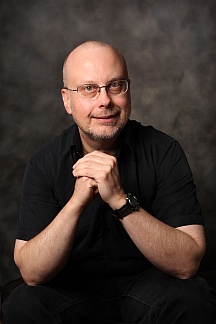 |
|
| photo: Bernard Clark | |
Award-winning sci-fi author Robert J. Sawyer has been appointed to the Order of Canada, which recognizes "outstanding achievement, dedication to the community and service to the nation." Sawyer was honored "for his accomplishments as a science fiction writer and mentor, and for his contributions as a futurist."
Also among the Order of Canada inductees announced yesterday by Governor General David Johnston were writer Jacques Godbout "for his significant contributions to the literary arts and critical thinking for over half a century"; and publisher Linda E. McKnight "for her pioneering achievements in publishing and for her unstinting support of Canadian writers."
Author Margaret Thomson Davis, whose "ability to render the texture and manners of Scottish working class communities, as well as their sights and sounds, and to render privation simply and unsentimentally, meant that she was often likened to Catherine Cookson, a comparison she accepted modestly, but without comment," died June 14, the Herald Scotland reported. She was 90.
Thomson Davis "was utterly committed to prose fiction" ranging from romance to murder to historical fiction. Of her 20-plus novels, the best known is The Breadmakers, first published in 1972. "Her ability to represent ordinary life in Scotland was not merely a matter of research. Her second volume of autobiography was tellingly entitled Write From The Heart. She was able to catch the rub and tension of a struggling family because she had grown up in one," the Herald Scotland noted.
---
Alan Rutsky, chief financial officer of Rizzoli International Publications, died on Tuesday. He was in the process of retirement when he became ill.
Rutsky joined Rizzoli in 2003 as CFO, and, among other things, oversaw the opening of the new location of the Rizzoli Bookstore in New York City. Earlier he was executive v-p and chief operating officer at Harry N. Abrams. Rizzoli said that Rutsky was "treasured by all members of Rizzoli staff for his wisdom, diplomacy, practicality, humor, and warmth."
 |
|
| photo courtesy New York Yankees | |
On Tuesday night, suspense author Michael Koryta threw out the ceremonial first pitch at Yankee Stadium before the game against the Texas Rangers. (Shelf Awareness judged it a strike!) He also signed copies of his most recent book, Last Words (Little, Brown), and some 10,000 fans were given cards for downloading an e-book version of Koryta's The Last Prophet, the first e-book promotion of its kind in major league sports.
 Wild Rumpus children's bookshop, Minneapolis, Minn., "is the kind of store most people would wish they had as kids. It's loud and vibrant, and unlike most bookstores, live animals roam between the towering bookshelves. Tourists make the store a must-see stop on their Minneapolis trips and locals bring their out-of-town families," Minnesota Monthly reported in a profile headlined "Wild Rumpus is a Bookstore Come to Life."
Wild Rumpus children's bookshop, Minneapolis, Minn., "is the kind of store most people would wish they had as kids. It's loud and vibrant, and unlike most bookstores, live animals roam between the towering bookshelves. Tourists make the store a must-see stop on their Minneapolis trips and locals bring their out-of-town families," Minnesota Monthly reported in a profile headlined "Wild Rumpus is a Bookstore Come to Life."
Co-founder Collette Morgan said she didn't want to follow business conventions, but rather design the store specifically for kids, with "the miniature front door, the canoe breaking through an icy lake on the ceiling, and reading nooks with overstuffed poufs and child-size chairs make the store look like something out of a child's imagination," Minnesota Monthly wrote.
"But I didn't want to work without animals," Morgan said, noting that for bookstore regulars, encountering animals is commonplace,with a menagerie that includes a ferrets, cats, chinchillas, a tarantula, birds, a few fish, and a chicken.
"Reading early on in life opens horizons," she added. "The store gets kids to read outside the box. It makes them better people."
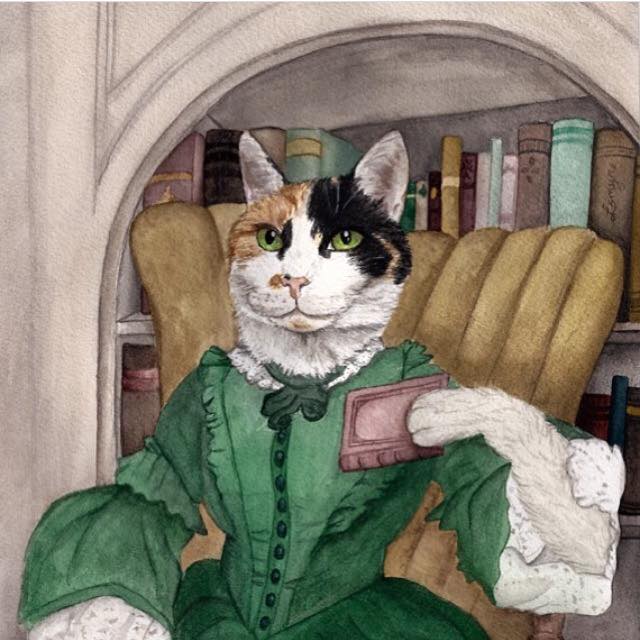 A Facebook post Saturday from Amelia, the official "greeter, lap warmer, best bookseller, token cute cat" at the Spiral Bookcase, Philadelphia, Pa.:
A Facebook post Saturday from Amelia, the official "greeter, lap warmer, best bookseller, token cute cat" at the Spiral Bookcase, Philadelphia, Pa.:
"The artiste who I commissioned to create my very elegant portrait will be in the shop selling her gorgeous art. I believe her human name is Julia. Please stop by to greet one of my favorite minions and view a masterpiece."

Today:
Fresh Air: John Doe, co-author of Under the Big Black Sun: A Personal History of L.A. Punk (Da Capo Press, $26.99, 9780306824081).
Sunday:
Face the Nation: Jean Edward Smith, author of Bush (Simon & Schuster, $35, 9781476741192).
Monday:
Imus in the Morning: Kevin Lacz, Ethan E. Rocke and Lindsey Lacz, authors of The Last Punisher: A SEAL Team Three Sniper's True Account of the Battle of Ramadi (Threshold, $28, 9781501127243).
Diane Rehm repeat: David Cole, author of Engines of Liberty: The Power of Citizen Activists to Make Constitutional Law (Basic Books, $27.99, 9780465060900).
A trailer has been released for Sully, Clint Eastwood's film based on the book Highest Duty: My Search for What Really Matters by "Miracle on the Hudson" airline pilot Chesley B. Sullenberger with Jeffrey Zaslow, Indiewire reported. The film, which stars Tom Hanks, Laura Linney and Aaron Eckhart, will be released September 9
---
Morgan Spurlock's (Super Size Me) Warrior Poets has acquired rights to the biography Can I Go Now?: The Life of Sue Mengers, Hollywood's Superagent by Brian Kellow biography. Deadline reported that Spurlock, who will direct, write a script and co-produce, "hopes to have a script by the fall and then will put the movie together quickly."
"I'm a fan of big personalities, great characters, and she is both," he said. "More than that, I love people who buck the trend and do things that haven't been done before and go into spaces unheard of, whether it be of gender or race. Sue Mengers took over the boys club of Hollywood and did something groundbreaking. She proved not only that she could be part of this world; she dominated it in a way that hadn't been done before, especially by someone so brash and outspoken and as charismatic as she was. She was almost like a breath of fresh air in Hollywood at the time, the one person who would tell you the truth, whether you liked it or not, it got her a lot of really loyal clients and carried her through the high points of her career."
Marcel Beyer won the €50,000 (about $55,495) Georg Büchner Prize, awarded annually by the German Academy for Language and Literature to authors "writing in the German language whose work is considered especially meritorious and who have made a significant contribution to contemporary German cultural life." Beyer was honored "for his exploration of Nazi history through experimentation with language," Deutsche Welle reported. The jury said Beyer "masters the epic panorama just as well as poetic microscopy."
The Büchner Prize, "along with the Goethe Prize, is considered the most important literary prize for the German language. It is named after the author of the influential German play, Woyzeck," Deutsche Welle noted.
---
A shortlist has been announced for the £5,000 (about $6,715) Wainwright Prize, which celebrates U.K. nature and travel writing "that best reflects renowned nature writer Alfred Wainwright's core values of celebrating the great British outdoors." The winner of the award, which is sponsored by Wainwright Golden Beer and supported by partners Stanfords and the National Trust, will be announced August 5. The six shortlisted titles are:
Common Ground by Rob Cowen
The Outrun by Amy Liptrot
Landmarks by Robert Macfarlane
The Moth Snowstorm by Michael McCarthy
The Fish Ladder by Katharine Norbury
The Shepherd's Life by James Rebanks
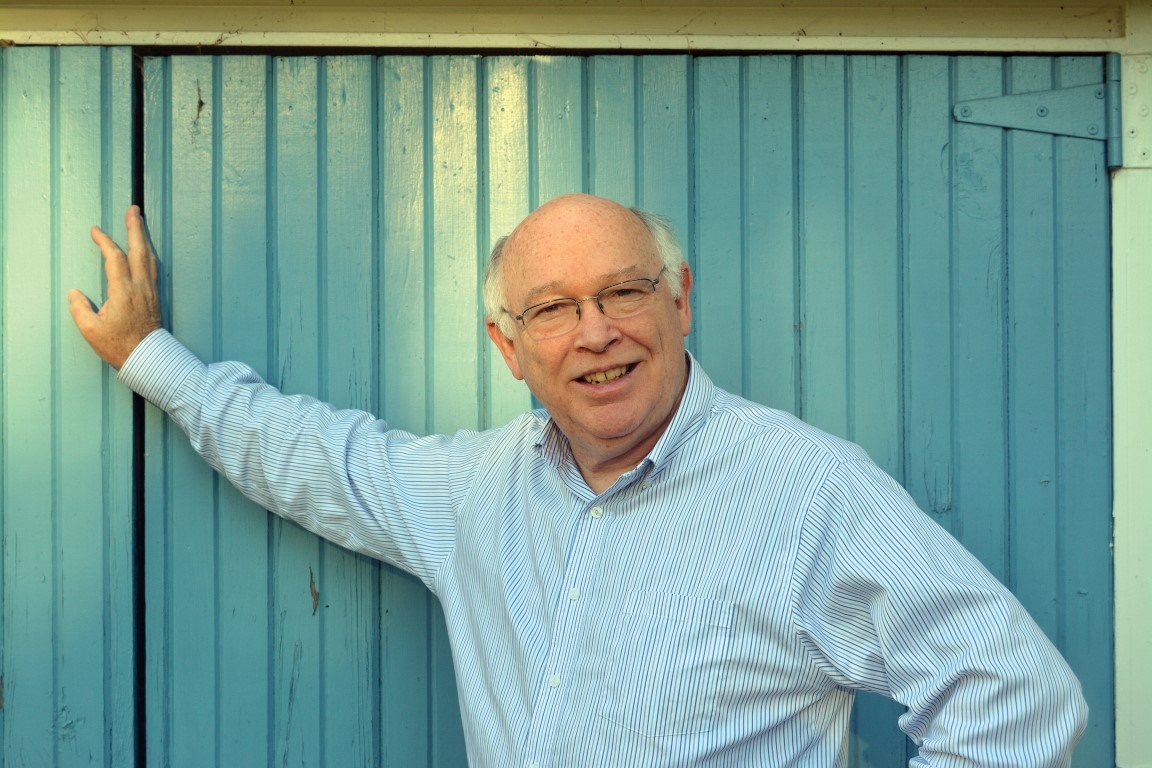 |
|
| photo: Elizabeth M. Higgs | |
Bill Higgs holds a B.A. in religion and social work, a Master of Divinity and a Ph.D. in Old Testament languages. Bill and his wife, author Liz Curtis Higgs, reside in Kentucky. Higgs's debut novel, Eden Hill, is published by Tyndale House (July 1, 2016).
On your nightstand now:
I usually have several books going at once. I just finished The Storytelling Animal: How Stories Make Us Human by Jonathan Gottschall, and Walter Isaacson's biography Steve Jobs is about half-done. I'm several chapters into Andy Weir's The Martian, and Small Victories by Anne Lamott is next in line.
And now for something completely different: since I'm teaching a class at my church on the biblical book of Amos next month, Peter Craigie's commentary Twelve Prophets is also there, with a couple of bookmarks stuffed between its pages.
Favorite book when you were a child:
It's hard to choose a favorite, given all the Hardy Boys and Tom Swift books I burned through (yeah, I was a nerd, and recently purchased a vintage collection of Hardy Boys). I was introduced to J.R.R. Tolkien in junior high school, so I'd have to say The Hobbit was the most memorable. Great story, and with a wonderful little storytelling wink to the reader. I read it again several years ago, and it still fired my imagination.
Your top five authors:
Currently David McCullough, Walter Wangerin, Annie Dillard, Anne Lamott and Wendell Berry. I find each of these authors extraordinarily intelligent and insightful.
Book you've faked reading:
Charles Dickens's A Tale of Two Cities when I was in high school. I read the first chapter, the last chapter and filled in the middle with Cliffs Notes. One of these days I'll get back to it, and see if death for Carton really was a "far, far better thing."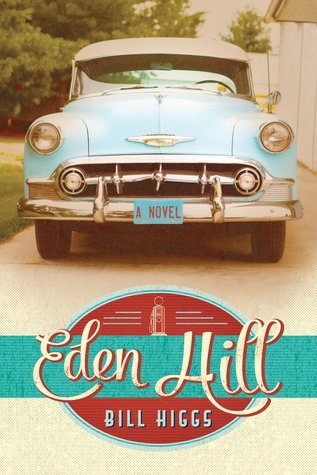 Book you're an evangelist for:
Book you're an evangelist for:
Ragman and Other Cries of Faith by Walter Wangerin. The opening story, "Ragman," is one of the few pieces of writing to bring me to tears. Wangerin is an extraordinary writer whose words are art for the mind.
Book you've bought for the cover:
Coma by Robin Cook. Yes, I know it's a bit macabre, but something in the cover spoke to me. The novel turned out to be frightening but somewhat prophetic.
Book you hid from your parents:
The Catcher in the Rye by J.D. Salinger. What else? I grew up in the '60s, and everybody was reading it under the covers late at night with a flashlight. It's what you did to rebel and be cool. Aside from that, I don't recall getting any wilder or more rebellious after reading Holden Caulfield's story.
Book that changed your life:
In His Steps by Charles M. Sheldon. It's very dated now, and the questions it raises are likely not the most theologically correct, but it was given to me by a great-aunt at my high school graduation and a time of spiritual questioning in my life. It was ultimately more a springboard for examining my faith in other ways. Sadly, its premise of inquiring as to what Jesus might do in a particular situation has been watered down to rubber bracelets with WWJD on them--more a fashion statement than a credo.
Favorite line from a book:
Interestingly, or maybe not, it's from Margery Williams's children's book The Velveteen Rabbit: "He didn't mind how he looked to other people, because the nursery magic had made him Real, and when you are Real shabbiness doesn't matter." I discovered this book during my days in seminary, long before I became shabby, but it continues to speak to me as I get older.
But then again, children's literature is often more profound than books written for those of us who think we are mature.
Five books you'll never part with:
Bird by Bird and Traveling Mercies, both by Anne Lamott, Celebration of Discipline by Richard Foster, Pilgrim at Tinker Creek by Annie Dillard and All I Really Need to Know I Learned in Kindergarten by Robert Fulghum. Each of these books is written from a deep spiritual base, but from widely different theological perspectives. You'll have to pry these from my cold, dead hands.
Book you most want to read again for the first time:
Probably Aleksandr Solzhenitsyn's The Gulag Archipelago. I first read this as a college student back when the cold war was still a stark reality. Since then, relations have thawed, but many of Solzhenitsyn's political and social criticisms remain valid. Certainly worth a second read.
Book you have not read that you should:
As a writer who feels that humor is a powerful tool, I need to go back to the catalogue of Mark Twain, and also examine some of the writings and commentary of Will Rogers, H.L. Mencken and G.K. Chesterton. I often learn more from curmudgeons than from Pollyannas.
The Hidden Letters of Velta B. by Gina Ochsner (Houghton Mifflin Harcourt, $26 hardcover, 9780544253216, July 26, 2016)
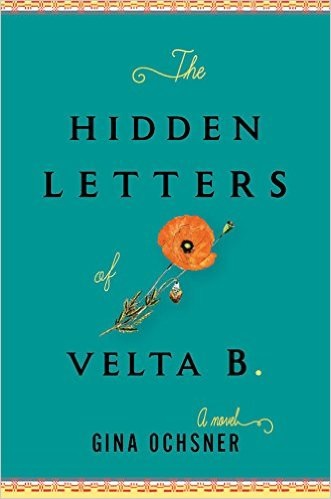 A modern-day Latvian village comes to life, complete with the characters, closeness and ancient grudges endemic to small towns the world over, in this second novel from Gina Ochsner (The Russian Dreambook of Color and Flight).
A modern-day Latvian village comes to life, complete with the characters, closeness and ancient grudges endemic to small towns the world over, in this second novel from Gina Ochsner (The Russian Dreambook of Color and Flight).
Born with a pair of fur-trimmed ears that grew to the size of soup bowls, Maris has always had the ability to hear the grass growing, the gossip moving through telephone wires and the murmurs of the dead in their plots, dug by his family, the local gravediggers. Now his mother, Inara, lies on her deathbed, telling him the stories of his family and neighbors, the secrets even his large ears have not heard. Some of the family anecdotes are funny, particularly those concerning his great-uncle Maris, for whom he was named: a flamboyant one-legged veteran who invented a bazooka-sized beet launcher and an electroshock "sloth-prevention" bracelet, among other gizmos. The stories underscore the tension between ethnic Latvians like their family and the Russians who moved to Latvia during Soviet times, or between the handful of Jewish households and the Protestant majority--although the feud Inara's father has with a Russian Jewish neighbor originates less in cultural disparity than competition for prime fishing spots.
As new wounds open and old ones heal, the words of Maris's great-grandmother Velta weave in and out of the narrative, taken from old letters she wrote to his great-grandfather during his imprisonment in the Soviet gulag. A mix of daily life, allegory, tragedy and folklore, written in words and even musical notes, and recovered by Inara from their foreclosed ancestral manor house, these missives offer glimpses into a past that left its scars on a family and a country.
For readers who love historical fiction and magical realism, The Hidden Letters of Velta B. is a gift on par with Joanne Harris's Chocolat. Wish-granting eels and a Ghost Girl lurk in its waters, printed words vibrate their stories to young Maris, and history speaks itself through the mouths of children. Although its citizens have access to modern technology, the bucolic setting and manual labor occupations of the main characters give the story a timeless feel, the struggles to find work and provide for children as universal as the need for ritual and the acceptance of each other's eccentricities. Quirky, ethereal, hilarious and sorrowful, Ochsner's intimate portrait of a group of people who must survive with each other's help, whether they like it or not, perfectly highlights the connections between the everyday and the transcendental elements of being human. --Jaclyn Fulwood, blogger at Infinite Reads
Shelf Talker: Citizens of a Latvian village coexist despite their eccentricities, with results both hilarious and devastating.
You know how sometimes, when you're listening to an album and the right song comes on (well, to be precise, Neil Young's "Tonight's the Night"), and you just keep hitting replay? Maybe--in a Twilight Zone kind of way--this is what's happening now, though instead of an album it's my column, and instead of one song it's an ongoing theme--booksellers and music. The beat goes on.
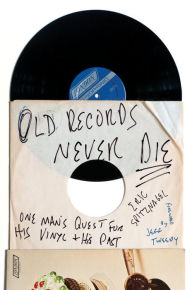 |
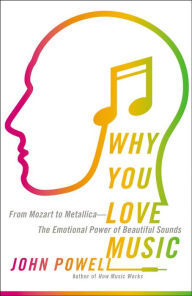 |
I loved the recent blog post by Daniel Goldin, owner of Boswell Book Company in Milwaukee, Wisc., on his personal history with vinyl records. "Now there's a vinyl resurgence, but a lot of folks have sold off, or even dumped their collections, and some people want them back," he wrote. "I can understand this, though I kept a good bit of mine. I'm a hoarder. But I still took to Eric Spitznagel's new memoir, Old Records Never Die: One Man's Quest for His Vinyl and His Past. Spitznagel, who decided that he was not only going to rebuild his collection, he was going to find the exact copies he lost. He thought it was possible. Whether it was possible is beside the point. It's all about the quest."
And this week, in a Wall Street Journal review of physicist John Powell's Why You Love Music, Peter Pesic noted that he found himself "intrigued by many of the studies he summarizes. Certain kinds of background music in stores measurably induces people to buy more: Classical music increases high-end buying by making people feel 'posh,' as Mr. Powell puts it.... What is more, playing French music will stimulate the purchase of French wine, as German music does for German wine. Using this effect in reverse, city officials in Sydney repelled teenage loiterers by playing 'uncool' music--the songs of Barry Manilow, to be precise; one wonders what would have happened had they chosen Mozart."
Which leads nicely to an e-mail I received from Angela Cozad, owner of Real Books, in response to my piped music columns: "I used to be a manager for Tower Books, a division of Tower records, in Concord, Calif. We had unlimited music to play, as you can imagine, because of the record stores. We used music to move our customers. During the day, we played classical, Bach, Beethoven and the boys as it was. In the afternoons we played light rock as our clientele started to shift to a younger crowd. In the evening, we sometimes played jazz or metal on the weekends but when we wanted to close the store at night--Mantovani cleared the store every night."
Speaking of clearing the store, John Evans, co-owner of DIESEL, A Bookstore, in Oakland, Brentwood and Larkspur, Calif., recalled that his first bookseller job was at Pellucidar, the original of the Berkeley Pegasus bookstores: "I would work Friday nights with Gerry Kleier. We sold records in that store, mostly used, and we would have duels with music. He had particular dislike of Reggae which I would slip in occasionally, hoping he would like some of it. We were really trying to blow each other's minds, not torture each other. But he always had the trump card: William Shatner's psychological renditions of pop songs, illustrating psychological states! 'Mr. Tambourine Man' won every duel."
To which I could only reply: "Ah, Mr. Shatner's golden tones. I do remember. I, however, cannot be too cynical, since in the 1960s I was the proud owner of two albums featuring David McCallum (of Man from U.N.C.L.E. fame). So there..." I never shared Illya Kuryakin's symphonic rendition of "(I Can't Get No) Satisfaction" with my bookstore patrons, however.
"I've been enjoying the music focus in your Shelf Awareness pieces," Evans also observed, "It's a sideways kind of solidarity with the booksellers around the country, through the music played in their stores; the ASCAP ridiculousness (yes we pay them for the music we now play through Spotify); and the changes in customer preference, bookseller choice, and technological apparatus.
"We had vinyl in our Oakland store from 1989 to around 2005; switched to CDs and tapes throughout that decade; and then to Spotify (and the occasional tape!) today. We've never allowed opera or very 'out' jazz (too compelling, attention-grabbing). Our store in Santa Monica plays no music, but there is music outside that is a curated list by an independent DJ and which is often as good as we ever would choose on our own. Our Larkspur store uses Pandora, largely overseen by our manager there Rod Froke, but expanded by contributions from other booksellers.
"Personally, I liked most the periods of both my first years in bookselling at Pellucidar in Berkeley (which also sold LPs and so had a vast range of options) and the first years of DIESEL when personal choice, carefully chosen, ruled the airwaves and where compliments from customers were common. The interplay of music and books was part of a fading cultural time of more open conversation about these two vital parts of our everyday imaginations--unmediated by other personal devices and cultural trends now dominating how we live.
"I still love music as a part of the everyday of our bookstores and know that for some of our customers this just one of the many pleasures of shopping at indie bookstores." Who says you can't get no satisfaction? --Robert Gray, contributing editor (Column archives available at Fresh Eyes Now)